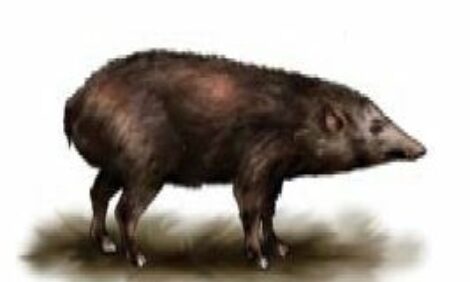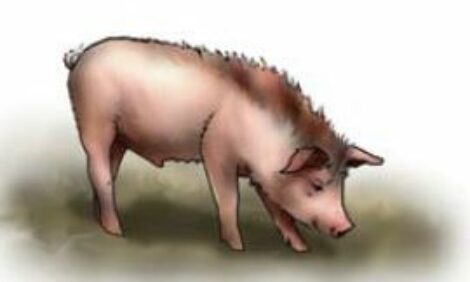



Bantu
The Bantu Pig is a domestic pig breed that is largely found in southern Africa. They are generally considered to have been bred from imported pigs from Asia and Europe, and are usually small or medium-sized once fully grown. One male Bantu pig and several Bantu sows were bought by the University of Pretoria to be studied, and numerous litters were developed. Traces of the Poland China breed were discovered in these litters, as well as traces of the English breed 'Gloucester Old Spot'.
Bantu average 6 to 10 piglets in a litter and will have two to three litters per year. The sow will nurse their piglets for three to five weeks, after which they have been fully weaned. Bantu piglets double their weight in the week after they are born, and quickly grow to full size. These pigs are generally kept in small holdings or households rather than being intensively farmed, but are butchered for their meat.
The average weight of a Bantu piglet at birth is roughly 2 lbs, and the body weight of an average adult Bantu pig was 210-220 lbs. The standard body colour of the Bantu Pigs is white with black spots, but reddish-tan pigs are also common in the breed as well. Reddish tan Bantu pigs are born with longitudinal lines similar to the native bush pig, suggesting that these are pigs which have also been bred with bush pigs in the past, and may not be entirely pedigree. Domestic Bantu Pigs do not behave like their cousins in the bush however, and will develop longer episodes of activity followed by smaller periods of sleep, rather than the hectic schedule kept by their wild counterparts. Generally Bantu Pigs do not flourish when accommodated with other pig breeds, and they are generally kept in large cages due to the size of the holdings they are raised on. Owners of large numbers of Bantu pigs will keep their pigs in larger areas however, as they can become very territorial even when domesticated.
Domesticated Bantu Pigs are very social animals, and work best in groups of two or more. A group of sows and a neutered male pig will work well, though more than one male, or any un-neutered males, will become too territorial to keep together. Bantu pigs will learn to coexist very well with others once a herd is formed, though the introduction of new females, gilt or sow, can lead any males in the herd to become quite agitated. Groups of male Bantu, neutered or not, can only be kept together with a large amount of space, and only then if there are no females present.








